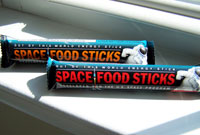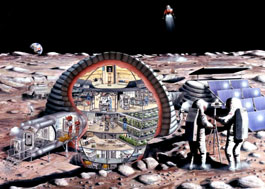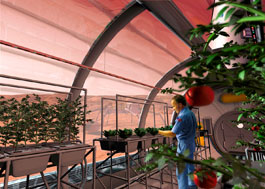Culinary Space Food That We Will Eat on Mars
 “I will never go to Mars, but I hope they’ll be eating my recipes,” says Jean Hunter, a biological engineering who assisted in the manufacturing process of Pop Rocks. Hunter and a carefully chosen elite crew are working to explore various dehydrated space food recipes that they can make taste more exceptional than the mere thought of it.
“I will never go to Mars, but I hope they’ll be eating my recipes,” says Jean Hunter, a biological engineering who assisted in the manufacturing process of Pop Rocks. Hunter and a carefully chosen elite crew are working to explore various dehydrated space food recipes that they can make taste more exceptional than the mere thought of it.
In a culinary classroom at Cornell University, nine astronaut trainees are preparing for a space mission simulation. With that said, they are taking a week to learn how they would cook on Mars. The project is called HI-SEAS, and the mission is to find a fail-safe strategy for feeding a human colony on Mars. By finding different ways of preparing space cuisine that will give energy, meet nutritional guidelines, and taste good, it will be a contributing factor in boosting morale for astronauts that are in space for long periods of time. When it is time for the simulation, there will be a total of six crew members that have met all particular specifications for the mission. 120 days of isolation in a Martian habitat located on Mauna Loa. Mauna Loa is a large volcanic mountain in Hawaii that contains absolutely to vegetation. The team will be restricted to only cooking and eating dehydrated and shelf-stable foods; hence the in-space eating on Mars culinary cooking tips. To get a picture about some of the ingredients that the team will have for the next four months to work with, freeze-dried shredded cheese (with a variety of course), powdered spices, freeze-dried beef and chicken pieces, seaweed and agar, and, which is probably not so bad, dehydrated fruits and veggies. Yum.
One of the main concerns about humans living on Mars is the amount of censer deprivation. Without seeing familiar people (let alone your own species at all), not being about to recognize regular colors around, sounds…etc., it would be easy to go a little crazy. With creating tasty foods that can be eaten on a regular basis, foods that astronaut’s taste buds are familiar to and when it can be consumed and cooked on Mars is crucial to shielding possible insanity.
“Deep frying is not compatible with life in a remote habitat on Mars,” Hunter exclaims.
A space crew is confided to extremely small quarters and with the atmospheric pressure on Mars being half of what it is on Earth, the oil would spit and fly instead of just falling. This would end with droplets of oil flying through the quarters and causing possible malfunctioning in vital systems.
“I think this is the best pizza I’ve ever tasted, but maybe that’s just because of the feeling that we made it together.” says Yvonne Cagle, a qualified NASA astronaut and Air Force colonel, MD.
Maybe we can get another quote from Dr. Cagle after four months in a Martian, Mars-like, habitat while eating virtually nothing but that dehydrated “best tasting pizza.” However, all more power to the awesome team of 6 brave astronauts for going above and beyond to find what tasty space-foods our species can live off of while living on Mars. We salute you.




(mh=LS1CbPo71X9UbWrp)8.jpg)
(mh=dpzCKhA90yEVm6bd)14.jpg)
(mh=IMfbVPftxg_P46rO)13.jpg)


(mh=Bmv-xwOvlryUsLRi)6.jpg)
(mh=d4mvZZx00GzeXe6n)9.jpg)

(mh=KBJKco0rQBGqCPnc)6.jpg)
(mh=noFfKQdtE_IIbKt1)5.jpg)
(mh=iE5zmUCsIyhZvLt1)8.jpg)

(mh=vQT4pF6gK73HWYvU)9.jpg)
(mh=xfzNZwt5rGBAHYx9)12.jpg)

(mh=f1qEfn8pkAEpzuBB)5.jpg)







![Getting A Boobjob From A_Mermaid [ Love Season Ep 14]](https://di.phncdn.com/videos/202108/16/393023501/original/(m=eaf8GgaaaWavb)(mh=EhxzDxzOFlKWGT5J)14.jpg)


(mh=EFCJ_CGTm6WJmD1h)7.jpg)
(mh=M5ap49qvQ6PqRwdL)9.jpg)
(mh=kimnexgYkNvJZKe7)8.jpg)
![Milfy City [v0.6e] Part 40Beautiful Woman_Body By LoveSkySan69](https://di.phncdn.com/videos/202002/29/288582622/original/(m=eaf8GgaaaWavb)(mh=mneHxjC9YH_1mlnR)7.jpg)

(mh=f9aRZE1zEX2E-f5t)9.jpg)

(mh=6kBVdek2bwggpFP0)10.jpg)



(mh=Bh5XrDbauTWPsP-w)14.jpg)


(mh=tifFYLV0EcYqedSO)9.jpg)
(mh=bMuxh3nLpztVTfOF)7.jpg)
(mh=DeMooG-QonPgtfc8)8.jpg)
(mh=X_KqK35ctRVo4SC2)6.jpg)
(mh=4KbJw7e_N5n_VoK5)6.jpg)
(mh=0CxWgaG3t1qheue7)6.jpg)
(mh=hfgrKhs4nAQfPy3c)14.jpg)
(mh=SkMyt6azOgqZ3Rz2)8.jpg)
(mh=sccrXOGCAoOFvdnw)13.jpg)

(mh=NHHmvKR9--DC9GF8)10.jpg)

(mh=q9tJFudw2fO31eus)8.jpg)
(mh=KiO0HNQVIT-cSPGa)13.jpg)

(mh=Rutj1QQBaEpSaIPp)15.jpg)

(mh=RZxR0ctLmlPxZ_G0)8.jpg)




(mh=3E8KJ_rMLV-vqehv)13.jpg)
(mh=IQtprYRy9ujSRZCQ)8.jpg)

(mh=q7Uo9mchAMPQjsum)10.jpg)




(mh=1JKA1HzaOJnLD_xi)8.jpg)

(mh=N1ynwXjvtOe9HbDL)8.jpg)

(mh=JGRrWu36E0rf6NX1)14.jpg)

(mh=HZ7r5Dc3sS82Ds0C)7.jpg)

(mh=fi-jtCllHX4gj1qp)9.jpg)

(mh=NndCOoQtQuxygxcX)6.jpg)


(mh=K0QSUuyYrgsSUvos)5.jpg)
(mh=rCCupBss66jXapbJ)9.jpg)

(mh=ArLyxYlYM_6tcSzX)13.jpg)





(mh=EcA9l4vYPL4V349f)8.jpg)
(mh=uEBaW0eo0BQ4MJbm)5.jpg)


(mh=GL3GsDtKzhN_7LE4)8.jpg)
(mh=9-suw1dHpm2e4-r8)9.jpg)


(mh=kFkoIutmxQgNW0Y-)10.jpg)

(mh=AzcvuKvvoE-50vYO)12.jpg)

(mh=cXMDS3XlSouttC3G)9.jpg)

(mh=sLp7AopG-AQD0abS)13.jpg)





(mh=7evgxodfN243W25i)8.jpg)



(mh=prY0653QZH5jT_rq)11.jpg)
(mh=iz6kEF7R9h5XGK-U)8.jpg)